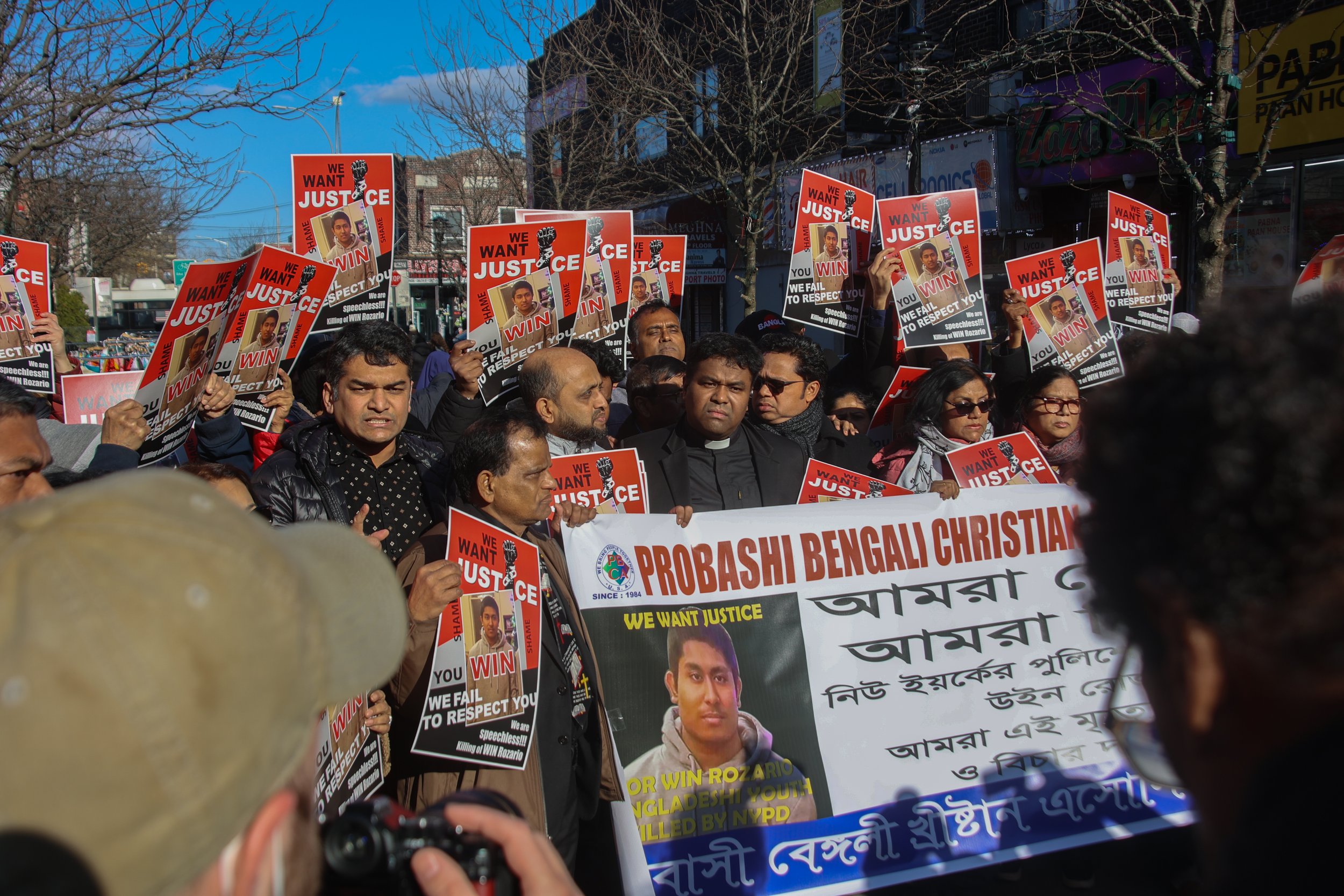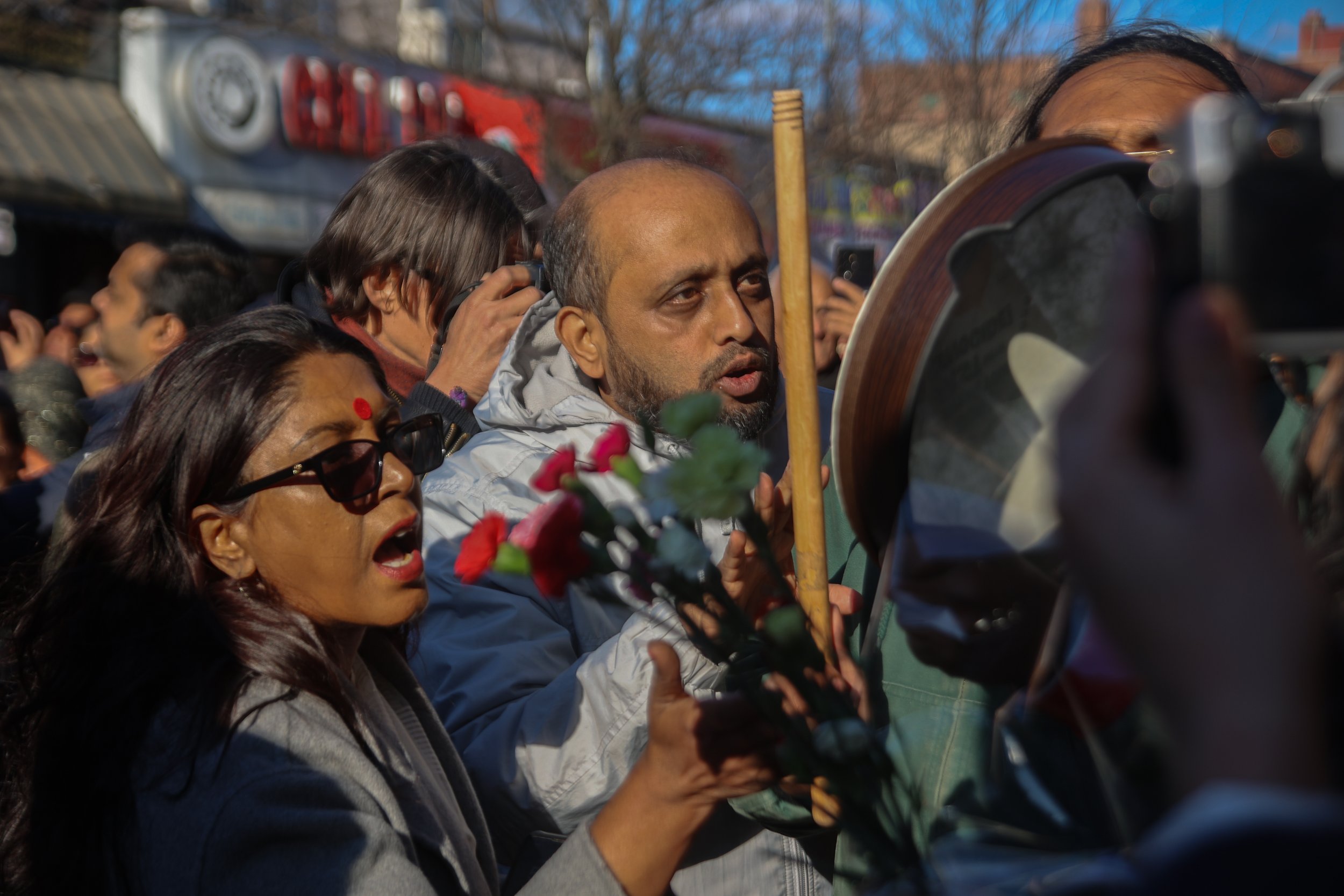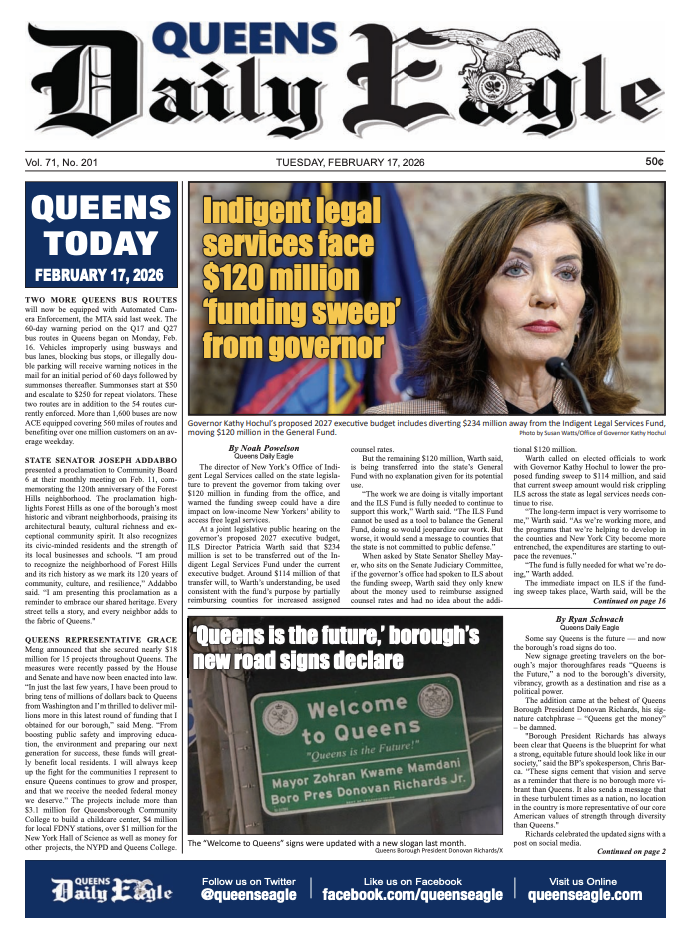Queens grapples with NYPD killing of 19-year-old
/The Queens community is grappling with the NYPD shooting death of 19-year-old Win Rozario in Ozone Park, as the city continues to deal with violence and a mental health crisis. Eagle photo by Ryan Schwach
By Ryan Schwach
In the wake of the police killing of an Ozone Park teen last week, communities in Queens are grappling with the 19 year old’s death and again asking questions about how the city should respond to its mental health crisis.
On Wednesday, March 27, NYPD officers responded to a call from the teen, Win Rozario, in Ozone Park. Rozario was going through a mental health crisis, and according to the NYPD;s version of events, had picked up a pair of scissors and moved toward the officers when they shot and killed him.
The killing has reignited calls for mental health practitioners to respond to mental health crises alongside the NYPD – or without them entirely – and resparked questions about the roles police should play in the nation’s largest city.
On Friday, that debate boiled over in the busy Diversity Plaza in Jackson Heights, where Bengali Ozone Park community members clashed with left-leaning protesters over disagreements regarding police as both groups mourned the death of Rozario.
Lal Morich, the leftist group self described on social media as a “Bangladeshi anti-imperialist diaspora organization,” scheduled a vigil for Rozario, and another group, a Bengali Christian organization and members of Rozario’s church scheduled a simultaneous vigil.
Members of the Bengali Christian group called for “justice,” but were not clear on exactly what that could look like.
“The truth should come out, and justice should be brought,” said James Roy, Rozario’s pastor at a Bengali Lutheran church in Ozone Park.
“The law will lead us to justice,” he said.
At one point during the vigil, a member of the religious organization said that the group wasn’t there to criticize the NYPD. The comment sparked frustration and anger from Lal Morich organizers, who took to their own megaphone to condemn the comment.
“My parents and my elders do not understand,” one activist said, “Their kids are going to keep getting killed.”
Both groups then began shouting over each other, differing on their political message and stance on the NYPD while also both mourning the death of 19-year-old Rozario.
Eventually the religious group ended their rally, while the Lal Morich organizers continued to criticize police, community members and elected officials who “normalize” the NYPD.
“These leaders are not for us,” the same activist said, calling the NYPD “fascists.”
Members of Lal Morich and attendees of their vigil declined to comment or speak to reporters at the scene.
According to the NYPD’s reporting of events, on March 27, Rozario was having a mental health crisis and called 911 around 1:40 p.m.
Two officers arrived at the two-family home around 103rd Street and 101st Avenue a few minutes later without the aid of a unit specifically tasked with responding to mental health calls, according to NYPD Chief of Patrol John Chell, who spoke outside the home following the shooting.
Chell said the situation inside the kitchen of the second-story home quickly became “hectic, chaotic and dangerous right away.”
NYPD officials claim that the teenager reached into a drawer and pulled out a pair of scissors. He then began to move toward the police officers, police claim.
That’s when the officers both fired their Tasers at him, knocking him to the ground.
The teenager’s mother, who was also in the apartment, then ran over to her son, accidentally knocking the Tasers out of the teen’s body, police said.
The 19-year-old then allegedly grabbed the scissors, got up and began to move toward the officers again, according to Chell.
The officers then fired their guns at the teen. He was pronounced dead shortly after at a nearby hospital.
The state Attorney General’s office will launch an investigation into the incident, as they are legally required to do with all police involved shootings.
Despite the chaotic scene described by the police, the teen’s pastor described Rozario as gentle.
While two groups mourned Rozario at separate vigils at Diversity Plaza last week, the groups clashed over differences in opinion over the NYPD and policing in New York. Eagle photo by Ryan Schwach
“He is an innocent boy,” Roy said. “Very innocent, very quiet.”
Roy also said that the family, whom he has spoken to, is “broken,” especially his mother, who witnessed her son’s death.
The killing also sparked responses from local elected officials, who argued the incident was an example of why mental health practitioners should accompany police on calls concerning mental health crises – particularly as Mayor Eric Adams continues to cite it as one of the major drivers of crime in the city.
“Win Rozaro made a call for help and it cost him his life,” said Councilmember Lynn Schulman, the area’s councilmember and chair of the committee on health. “Our system failed him.”
“Instead of a police response, mental health professionals should have been sent to him,” Schulman said. “Win Rozaro deserved to grow up and live a long, healthy life. No family should face the insurmountable loss that Win’s family now faces. It is our responsibility to do everything in our power to properly invest in the programs and facilities capable of saving New Yorkers’ lives.”
Schulman cited the Mental Health Roadmap, rolled out by the Council last year, which would invest in the mental health workforce and increase public awareness of available resources, as well as the New York State Subway Co-Response Outreach Teams Program, which was recently expanded by the governor and places health care professionals with cops in the subway system.
Adams himself has been relatively silent about the Rozario shooting amid the death of NYPD Officer Jonathan Diller. The incident was not mentioned at a Woodhaven rally not far from where the shooting took place the same night as the shooting. Adams was criticized his lack of comment on Rozario's death in a high-profile interview on “The Breakfast Club” last week.
In an op-ed he wrote for amNY, Public Advocate Jumaane Williams spoke of Rozario’s death alongside the killing of NYPD Officer Jonathan Diller in Far Rockaway and other deaths which have rocked the five boroughs in recent weeks.
“When each of these New Yorkers is laid to rest, the grief on the faces of their families will look the same,” he wrote. “It will echo the pain I’ve seen at countless funerals for police officers, for victims of police shootings, for children killed by a stray bullet in the street. I’ve joined so many in mourning victims of violence, and each memorial chips away at my spirit but strengthens my resolve – the call to do all we can, with all we have, to change this status quo of loss.”
In the op-ed, Williams spoke of the anger felt in communities over recent deaths, and the divisiveness that has come from them amid shootings of police, and at the hand of police.
"I could never tell someone how to grieve – a deeply personal feeling in the sea of trauma that overtakes entire communities,” he said. “But I can say that I have seen the benefits of turning pain into purpose, and purpose into progress. And maybe, a week like this can pull us out of our entrenched, reactionary positions so that we can instead address the entrenched systems that have led to far too many funerals."





